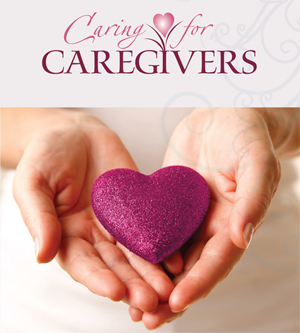By Mary K. Spengler
[C]aring for a loved one, whether a family member, friend or neighbor, is becoming increasingly common as the baby boomer generation continues to age.
According to AARP and the National Alliance for Caregiving, 40 million Americans provide care for an adult friend or family member who is ill. While the typical family caregiver is a 49-year-old woman, there is an increasing number of men serving in this role. In addition, about one-quarter of all caregivers are now between the ages of 18 and 34.
The responsibilities of family members or friends that find themselves in this situation do not end with caregiving; many also hold full-time jobs. Caregiver obligations can place demands on their schedule and emotions, causing significant stress both in and outside of the workplace. For this reason, those in this position must be sure to take care of themselves in order to protect their own health and well-being in all aspects of their life. It is imperative that caregivers understand that taking care of themselves is just as important as caring for a loved one.
While there are myriad rewards for providing care for another person, there are also potential risks to the caregiver’s health. Signs of caregiver stress may build up slowly and might not be immediately noticeable. Coworkers, friends or loved ones may detect mood changes, impatience with colleagues and clients and a lack of joy in workplace and social activities. Anxiety, irritability and exhaustion also are common signs.
Stress can contribute to lost wages and ill health effects on the caregiver without the proper tools and exercises. Some simple steps can be taken to prevent or minimize the effects of stress. Seeking help is paramount. Very few people can handle the financial, physical, emotional and logistical burdens alone. Take turns with a family member. Pay attention to your own limitations and know when to ask others for assistance.
According to the Family Caregiving Alliance, it is not unusual for caregivers to develop mild or more serious depression as a result of the constant demands they face in providing care. Be sure to know what the signs of depression are — which include notable increase or decrease in appetite, fatigue, change in sleep patterns, and a loss of interest in people and/or activities that once brought you pleasure, among others — and ask for help through individual counseling or a community-based support group.
In order to avoid any misunderstandings with their loved one’s medical team, caregivers must take the time to communicate with them. Ask questions of the doctors, nurses and social workers and understand when and where the professionals must step in.
Personal time is absolutely essential for those managing a full-time job and caring for a loved one. They should be encouraged by those around them to explore options for using personal time for both caregiving and self-care. They may need reassurance that taking time off, even for half a day or just a few hours, will not adversely impact the company or their job.
Perhaps most importantly, caregivers should not forgo enjoyable activities. Spend time with friends. Gardening, reading, painting, exercise and meditation can help to alleviate the stresses of caregiving. It is imperative that they spend enough time on themselves while caring for a loved one.
Being a caregiver can be very rewarding, but it is also a balancing act. Caregivers must be aware of their own health and well-being as much as they are about that of their loved ones.
Complete Article HERE!
